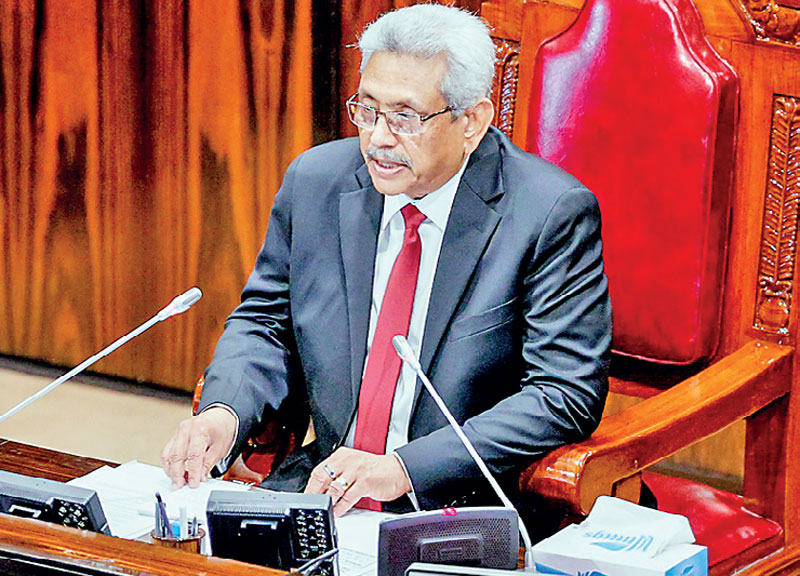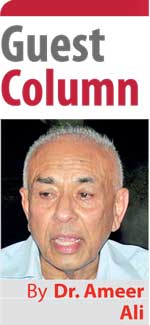Wednesday Feb 18, 2026
Wednesday Feb 18, 2026
Saturday, 22 January 2022 00:02 - - {{hitsCtrl.values.hits}}

Behind all those vacuous statements in that address, GR is openly strengthening his support base, the triple M: military, monks and militants

President GR’s opening address to a parliament noted for its mediocre talent and disrespect to norms and values of a national legislature, had nothing to reassure the nation that the next three years of the regime would be anything better than the last two. The behaviour of the members is symptomatic of the nation’s descent to moral bankruptcy and societal chaos.
The President’s much awaited address was of no relevance to the prevailing economic disaster, but filled with bravados on how determined is he to turn the country greener and eco-friendly and how successful the regime is in protecting the national interest amid conflicting pressures from India, China and the West. As usual there were plenty of grand promises about distant prosperity without any mention about measures to tackle the immediate crisis that is suffocating the nation.
There were also untruths about the regime’s human rights record. For example, GR claimed that he never trampled upon anybody’s human rights during the last two years. If so, what was trampled when Muslims were forced to cremate their COVID-dead bodies? UNHCR has a catalogue of such violations if the President only cared to read its reports.
However, there were two vital ingredients missing in the president’s cuisine: sustainable remedial measures to revive the economy from its immediate crisis and the national question. To take the second first, without even mentioning that subject GR was audacious in urging law makers from north and east to support his development projects. This in other words was regurgitation of what he said two years ago that the solution to reconciliation was not devolution of power but economic development.
One cannot build a nation by keeping almost one-third of its population disconnected and disgruntled with a regime that is pandering to the vile sentiments of Buddhist majoritarianism. One would have thought that after his apologies for past mistakes there would be some positive signals in that speech pointing to a change of direction and a new resolve to build a united Sri Lanka by guaranteeing all its citizens equal rights and obligations. Sadly, it was not there.
No wonder that the leader of TNA, Sampanthan, was reported to have told the Minister of Finance, Basil Rajapaksa, that the President’s address was “rubbish”, and that an embarrassed minister cut short the dialogue, thanked the leader and quickly disappeared from the scene. In summary, the driving spirit behind GR’s address was not about the economy or nation building, but about the regime’s political future.
On the second, enough has been said. In summary, Sri Lanka is in an unparallel economic mess. Long and winding queues in front of retail outlets for cooking gas, food items, building materials and in fact for anything and everything, has sadly become a monotonous scene to watch daily. Power cuts, gas cylinder explosions and loss of income and employment add to the agony. On top of all this is the spread of Omicron. Even one meal a day is becoming a luxury for many individuals, and economic deprivation is driving the desperados to test their fortunes in crimes and other evils. This was not the Sri Lanka two years ago.
The treasury is running dry of foreign reserves. Central Bank’s Chief, Nivard Cabraal with his fat pension and cabinet status, goes on printing money paying two hoots to its impact on inflation. The amount of treasury bills held by the bank has exceeded a couple of trillions of rupees. Food inflation today stands at 22%, according to one source. Of the $ 1.6 billion left in foreign reserves Cabraal used $ 500 million to pay off Sovereign Bonds. Borrowing from friends and neighbours to replenish the reserve stock is the name of Cabraal’s game.
While he assures the President and hoodwinks the public on the long-term success of his novel strategy, international credit agencies had downgraded the country’s risk level sending alarm signals to private investors. While Cabraal expects the economy to grow by 5%, World Bank expects it to drop to 2.1% in 2022 from 3.1% last year, and predicts income per capita also to contract by 2% while all other Asian nations would experience a rise. Does one need any more evidence to show the depth of the crisis?
While the economy is on life support the growing political disunity within the ruling coalition and plummeting popularity of the regime is turning GR’s attention towards planning for political survival. With all criticisms and inuendoes about the Government from within the coalition there is no way that it would break up soon because the junior partners face too much to lose from breaking away. However, it is not the quibbles in the coalition, but the ever-growing discontent of the populace that should be far more worrying to the President and his regime.
Behind all those vacuous statements in that address, GR is openly strengthening his support base, the triple M: military, monks and militants. The common denominator of all three is Buddhism, and GR is openly advocating that he is a President elected by the Buddhists, for the Buddhists and of Buddhists. This is why the national question is totally ignored in his address.
Some of his recent measures such as the appointment of a militant monk to head the controversial OCOL task force, appointing another less known monk to the Chancellorship of a national university amid protests from academics and graduands, encouraging the monks at Kuragala monastery in Ratnapura to expand and rebuild that precinct with no concern at all to its adverse impact on the adjacent Muslim Sufi shrine and feelings of its patrons, and in addition to all this, his Prime Minister’s announcement to make Nainativu a suddhabumi, are all to strengthen GR’s credentials as the President only to Buddhists. This is a sure recipe for a chaotic nation in the future.
His address showed no interest in solving the national issue and nation building. It was in short, an endorsement of what a Catholic prelate said recently that the moral conscience is dead in Sri Lanka.
(The writer is attached to the School of Business and Governance, Murdoch University, Western Australia.)